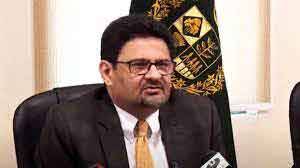ISLAMABAD - Pakistan has received the draft of Memorandum of Economic and Financial Policies (MEFP) from the International Monetary Fund for the combined 7th and 8th reviews.
“Today, the Government of Pakistan has received an MEFP from the IMF for the combined 7th and 8th reviews,” said Federal Minister for Finance and Revenue Miftah Ismail on Tuesday. The draft MEFP is a prerequisite for paving the way for moving towards striking a staff-level agreement.
Finance Minister and Governor State Bank of Pakistan would sign the MEFP document after reviewing it. Later, the staff-level agreement will be presented before the IMF’s Executive Board next month for approval after which the tranches will be released.
Pakistan would receive two tranches worth of $1.9 billion from the IMF, one as $900 million as the seventh tranche and $1 billion as the eighth tranche, the Finance Minister said while addressing the conference titled “Turnaround Pakistan”.
He once again said that the incumbent government has saved the country from the default through difficult decisions. “Now, there is no chance that Pakistan will default,” he said and added, “The situation is still difficult; we need to tread on path.”
He made it clear that the government would have to follow fiscal discipline, as the country cannot afford massive deficit budgets of Rs5 trillion annually.
Addressing the conference, the Finance Minister said that Pakistan is having lower tax to GDP ratio of 8.6 percent, which is lowest in the world. He further said that the incumbent government would improve the tax collection of the country. The federal government has imposed super tax on rich people instead of putting additional taxation burden on the poor people. He added that taxes had been increased even on companies owned by the prime minister’s sons.
“Even my company will have to pay more taxes now,” Ismail said and added that we can only ask the nation to sacrifice if we do the same. He said that the government has not taken indirect taxes instead it took direct tax on wealthy people earning more than Rs150 million.
Similarly, the government has also imposed super tax on 10 percent of industries. The government had imposed direct taxes as opposed to non-direct as the former were non-inflationary. “This year, we will take 33pc more tax than last year which is an achievement.”
He once again criticized the previous government for giving Rs120 billion monthly subsidy on oil products, which was three times higher than the monthly expenditure of running civil government. Therefore, the government had taken tough decisions to increase oil prices to save Pakistan from default. He thanked the nation for supporting the government and understanding the need to hike petrol and diesel prices.
The Finance Minister said that the government is also bringing shopkeepers into the tax net. In the coming days, the government would also bring builders, real estate agents, car dealers and carpenters into tax net. He said that the government would facilitate the business community in taxation. He once again asked the affluent class to pay their due tax for the prosperity of the country.
He said that economic growth in Pakistan required strong fiscal discipline and economic management. “Prime Minister Shabaz Sharif’s dream is to take Pakistan towards self reliance, sustainable and inclusive growth,” he said and added “This goal is not difficult.”
He said that incumbent government has provided relief to the poor people by providing monthly stipend of Rs2000 per month. “We intend to provide relief to 6 million people, of which 4 million are already registered. The Prime Minister has provided a scheme for cheap petrol and food which will benefit 6 million people,” he said.
Talking about the economic situation, the Finance Minister said that the country’s debt payment has increased massively in last few years. The country’s debt servicing was Rs1,500 billion per year in 2018 when PML-N left the government, has now gone to Rs4,000 billion.






